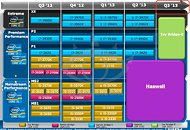- Joined
- Oct 9, 2007
- Messages
- 47,670 (7.43/day)
- Location
- Dublin, Ireland
| System Name | RBMK-1000 |
|---|---|
| Processor | AMD Ryzen 7 5700G |
| Motherboard | Gigabyte B550 AORUS Elite V2 |
| Cooling | DeepCool Gammax L240 V2 |
| Memory | 2x 16GB DDR4-3200 |
| Video Card(s) | Galax RTX 4070 Ti EX |
| Storage | Samsung 990 1TB |
| Display(s) | BenQ 1440p 60 Hz 27-inch |
| Case | Corsair Carbide 100R |
| Audio Device(s) | ASUS SupremeFX S1220A |
| Power Supply | Cooler Master MWE Gold 650W |
| Mouse | ASUS ROG Strix Impact |
| Keyboard | Gamdias Hermes E2 |
| Software | Windows 11 Pro |
Intel's next high-end desktop (HEDT) platform, codenamed "Ivy Bridge-E," is slated for Q3-2013, according to the latest platform road-map slide sourced by VR-Zone. According to the leaked slide, launch of Ivy Bridge-E Core i7 processors follows that of Core "Haswell" socket LGA1150 processors (Q2-2013). What's more, the upcoming Ivy Bridge-E chips will be compatible with existing socket LGA2011 motherboards, based on Intel X79 Express chipset.
Intel's next-generation Ivy Bridge-E chips are up-scaled versions of today's Core "Ivy Bridge" chips, built on the same 22 nm process, with more processing cores, memory channels, cache, and PCI-Express 3.0 certified system interfaces. It remains to be seen if Intel launches a new chipset to go with the new processor, or retains the X79 chipset with a few minor updates in the form of steppings. The company retained its X58 Express chipset over the first two HEDT processor generations (45 nm Core i7 "Bloomfield" and 32 nm Core i7 "Westmere").

View at TechPowerUp Main Site
Intel's next-generation Ivy Bridge-E chips are up-scaled versions of today's Core "Ivy Bridge" chips, built on the same 22 nm process, with more processing cores, memory channels, cache, and PCI-Express 3.0 certified system interfaces. It remains to be seen if Intel launches a new chipset to go with the new processor, or retains the X79 chipset with a few minor updates in the form of steppings. The company retained its X58 Express chipset over the first two HEDT processor generations (45 nm Core i7 "Bloomfield" and 32 nm Core i7 "Westmere").

View at TechPowerUp Main Site
Last edited:







